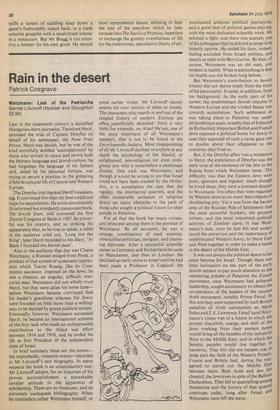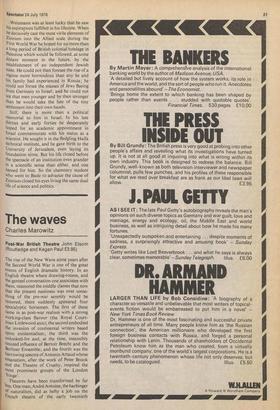Rain in the desert
Patrick Cosg rave
Weizmann: Last of the Patriarchs Barnet Litvinoff (Hodder and Stoughton £5.95) Late in the nineteenth century a dandified Hungarian-born journalist, Theodore Herzl, attended the trial of Captain Dreyfus on behalf of his newspaper, the Neue Freie Presse. Herzl was Jewish, but he was of the kind scornfully dubbed 'assimilationist' by those who strived to retain and revive both the Hebrew language and Jewish culture: he had forgotten the language of his fathers and, aided by his personal fortune, was trying to secure a position in the glittering if febrile cultural life of Central and Western Europe.
The Dreyfus trial marked Herzl's awakening. It convinced him that the Jews could not hope for assimilation. He wrote an extremely ill-informed but mordantly passionate book, The Jewish State, and convened the first Zionist Congress at Basle in 1897. So powerful was his oratory, and so striking his appearance that, as he rose to speak, a rabbi in the audience cried out, 'Long live the King': later Herzl recorded in his diary, 'At Basle I founded the Jewish state'.
Also in the audience that day was Chaim Weizmann, a Russian emigre from Pinsk, a product of that system of systematic oppression which Tsarist Russia, like its Communist successor, imposed on the Jews; he was a chemist, an angular, difficult, mercurial man. Weizmann did not wholly trust Herzl, but they were allies for some time— before Weizmann became convinced that his leader's grandiose schemes for Jewry were founded on little more than a willingness to be dazzled by grand political society. Eventually, however, Weizmann succeeded Herzl; he became an international scientist of the first rank who made an indispensable contribution to the Allied war effort between 1914 and 1918, and he ended his life as first President of the independent state of Israel.
In brief summary these are the events— the improbable, romantic events—recorded in Mr Litvinoff's new biography. In many respects the book is an unsatisfactory one: Mr Litvinoff adopts, for an historian of his proven accomplishment, a remarkably cavalier attitude to the apparatus of scholarship. There are no footnotes, and an extremely inadequate bibliography. When he contradicts either Weizmann himself, or some earlier writer, Mr Litvinoff merely asserts his own version of dates or events. The characters who march in and out of the tangled history of modern Zionism are often superficially sketched : there is very little, for example, on Ahad Ha'am, one of the most important of all Weizmann's mentors, that is not to be found in the Encyclopaedia Judaica. Most disappointing of all Mr Litvinoff declines to explore at any depth the psychology of the Mask/I, or enlightened, non-religious (or even irreligious) Jew who is nonetheless a passionate Zionist. One such was Weizmann; and though it would be wrong to say that Israel could not have been created by the Orthodox, it is nonetheless the case that the rigidity, the internecine quarrels, and the often immovable archaism of religious Jewry set many obstacles in the path of those who sought a political future for their people in Palestine.
For all that the book has many virtues, and principal among them is the portrait of Weizmann. By all accounts, he was a strange combination of mad scientist, obsessional politician, intriguer, and charming diplomat. After a successful scientific career in Germany and Switzerland he came to Manchester, and then to London. He declined an early move to Israel until he had been made a Professor in England. He punctuated arduous political journeying, and a good deal of political games-playing, with the most dedicated scientific work. He relished a fight, and there was scarcely one of his colleagues that he did not at some time bitterly oppose. He ended his days, indeed.
feeling excluded from Israeli politics, and deeply at odds with Ben-Gurion. By then, of course, Weizmann was an old man, and broken in health. What is astonishing is that his health was not broken long before.
But Weizmann's contribution to Jewish history did not derive solely from the force of his personality. It came, in addition, from his background. In the early part of his career, the predominant Jewish impulse in Western Europe and the United States was towards assimilation. Such settlement as was taking place in Palestine was under philanthropic aegis, notably that of Edmond de Rothschild. Important British and French Jews opposed a political home for Jewry in case their espousal of such a cause gave rise to doubts about their allegiance to the countries they lived in.
But, if the Dreyfus affair was a revelation to Herzl, the experience of Dreyfus was the daily coin of the existence of the Jew in the Russia from which Weizmann came. The difficulty was that the Eastern Jews were poor, ignorant and bigoted : much though he loved them, they were a constant despair to Weizmann. Too often they were regarded by Western Jews as no more than objects of shuddering pity. Yet it was from the barren area of the Russian Pale of Settlement that the most powerful thinkers, the greatest writers, and the most important . political activists of Zionism came. It was Weizmann's task, once he had felt and understood the attraction and the importance of sophisticated Western'Jewry, to blend East and West together in order to make a home in the desert of the Middle East.
It was not always the political desert it has since become for Israel. Though there was little inclination on the part of the earlY Jewish settlers to pay much attention to the wandering fellahin of Palestine the Zionist movement, once Weizmann had achieved leadership, sought assiduously to obtain the co-operation of the leaders of the nascent Arab movement, notably Prince Feisal..In this aim they were supported by such British paladins of Arab nationalism as Mark Sykes and T. E. Lawrence. Feisal'sand Weizmann's vision was of a future in which the proven discipline, energy and skill of the Jews working from their ancient home would bring all the benefits of the industrial. West to the Middle East; and in which the Semitic peoples would live together In harmony. That this did not happen was in large part the fault of the Western Powers. France and Britain had, during the war, agreed to parcel out the Middle East between them. Both Arab and Jew felt cheated, the Jews even in spite of the Balfour Declaration. They fell to quarrelling among themselves and the history of that quarrel continues today, long after Feisal and Weizmann have left the scene. .Weizmann was at least lucky that he saw his aspirations fulfilled in his lifetime. When he decisively cast the most virile elements of Zionism into the Allied scale during the First World War he hoped for no more than a long period of British colonial tutelage in Palestine which would be followed, at some distant moment in the future, by the establishment of an independent Jewish state. He could not then foresee the rise of a regime more horrendous than any he and his family had experienced in Russia; he Could not forsee the masses of Jews fleeing from Germany to Israel; and he could not see that men younger and by then stronger than he would take the fate of the tiny settlement into their own hands.
Still, there is more than a political Memorial to him in Israel. In his late thirties and early forties he desperately hoped for an academic appointment in Israel commensurate with his status as a scientist. He sought it in the fledgling Haifa technical institute, and he gave birth to the University of Jerusalem, even laying its foundation stone. But his life closed before the spectacle of an institution even grander In a scientific sense than either, and one named for him. So the chemistry student Who went to Basle to advance the cause of Zionism closed his eyes living the same dual life of science and politics.



































 Previous page
Previous page